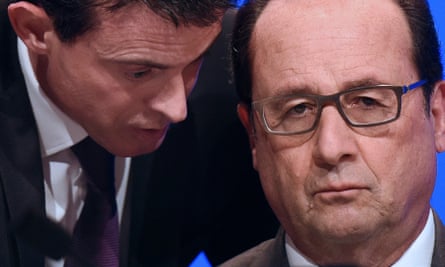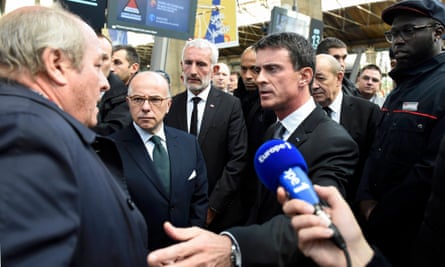Inside his heavily guarded official residence on the left bank, Manuel Valls, the tough-talking prime minister who has orchestrated France’s hardline security response to the Paris terrorist attacks, was uncompromising that the country’s war on terror would last a long time amid a “permanent” threat of more attacks.
If François Hollande has declared “France is at war” and set out to travel the world this week in search of an international coalition against Islamic State (Isis), it is the straight-talking “strongman” Valls who has crafted and pushed tough security measures at home and set about explaining them to a fearful and grieving nation.
Valls has spearheaded the nationwide state of emergency that will last at least three months, giving special powers to police to act without judicial oversight, and he has gone further than Hollande in his heightened language warning of the risk of a chemical attack. French radio even reported that at one point during crisis meetings about the Paris attacks on a stadium, bars and the Bataclan theatre – in which 130 people were killed in three hours – an impassioned Valls walked up to Hollande and shook him.
At an informal meeting with a handful of foreign media outlets, including the Guardian, Valls said France’s war would be long and lasting but “we will win on all fronts” abroad – against Isis – and at home, against the radicalised young people taking up arms against their fellow French. He believed Europe was “facing its destiny” and must prove it could deal with both the terrorism threat and the refugee crisis if voters were not going to turn towards populism. He said France would take no more refugees beyond the 30,000 already agreed for the next two years.

Valls, a reform-minded social democrat whose pro-business, unorthodox socialist politics have seen him likened to Tony Blair, and whose uncompromising stance has drawn comparisons with Nicolas Sarkozy, said France was facing a new era in terrorism: a form of multiple and coordinated attacks on civilian targets organised from outside the country and within.
On the night of Friday 13 November, when Hollande was at the France-Germany football match at the Stade de France, where the first suicide bombers struck, Valls was at his home in Paris’s 11th arrondissement 150 metres from the La Belle Équipe bar, one of several places where gunmen opened fire. For months – even before French gunmen carried out massacres at the Charlie Hebdo offices in Paris and a kosher grocery store that killed 17 in January – Valls had been saying that fear of a mass terrorist attack on France was the only thing that kept him awake at night.
In the afternoon before the attackers hit, he had told journalists of the ever-present risk of attack. Valls said later: “I got a text message from [the interior minister] Bernard Cazeneuve saying there was a probable explosion at the Stade de France and another at République. Then a journalist friend who lives above the Belle Équipe called and said: ‘It’s terrible, there’s shooting everywhere, people have been killed.’ My first reaction to my wife, Anne, was: ‘This is it, this is the attack we’ve been dreading.’”
He said he felt shivers, “because I realised we were unfortunately facing multiple attacks and didn’t know at that moment if it would keep going and whether there would be more – which there was in the case of the Bataclan.”
His bodyguards got him out of his apartment and to the crisis meeting in the basement of the interior ministry. He said he and the head of state “went straight into action mode”, only absorbing the full human impact late that night when visiting the site of the “absolute horror” of the Bataclan attack, and seeing the wounded and traumatised. Hours later he found out that Victor Muñoz, 24, the son of close friends, had been killed while sitting outside La Belle Équipe. He said of France’s politicians: “I think we haven’t even yet totally felt the impact because we’ve been in the action for 10 days. I think I’ll feel the impact when I go to that young boy’s funeral on Thursday morning. And we’ll feel it on Friday at the national [commemoration] ceremony.”

Valls said the state of emergency measures – which allow police to act without judicial oversight and have already led to 1,233 searches, the seizure of 230 arms and 266 people placed under house arrest – were not “a withdrawal of liberties” but a strong political message to the security forces that “this was not just one attack, it is a permanent threat”.
In January, after the Charlie Hebdo and supermarket attacks by French gunmen from poor backgrounds, Valls – who was born in Barcelona and did not obtain French citizenship until he was 20 – made the most damning indictment yet of the country’s bitter social divide, saying there was “territorial, social and ethnic apartheid” in France.
This time, when several of the eight attackers were French, he said the government’s reaction had to be purely focused on “security and the fight against terrorism” because French people’s priority was to feel safe and it was not the moment to open up debates about society’s ills.
The opinion poll popularity of both Valls and Hollande has risen since the attacks, but Marine Le Pen’s far-right Front National party is predicted to make large gains in regional elections in early December.
Before the attacks, Valls had called Front National “antisemitic and racist”, warning that any gains would be a national “drama”. After the attacks he said his priority was national unity and cohesion, and he would not descend into party politics. He said the government had to unite the nation around fundamental values and not the “simplistic discourse of the far-right that terrorism is Muslims, immigration or Europe.”

Comments (…)
Sign in or create your Guardian account to join the discussion